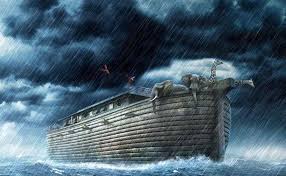This past Shabbat during my weekly sermon I broke my general rule of not speaking about politics. And I have Noah to thank for it …Yeah, that Noah, the one of Flood fame.
According to the Zohar, when he exited the Ark and witnessed all the destruction, he turned to God and challenged God. “You are called the Lord of Mercy and Compassion; how is it possible you engaged in such destruction?” To which God supposedly responded: “Noah – now you say something?!? When I told you I was going to bring a flood you said nothing. When I told you to build an Ark you said nothing. When I told you that you better get in that Ark with your family or otherwise you’ll get caught up in the great flood and its destruction, you said nothing. All you had to do Noah was to challenge Me then – to pray on behalf of the people about to be punished and seek forgiveness and a second (or third) chance on their behalf. But you said nothing … so I did nothing.”
All of which raises a good question: Why didn’t Noah pray on their behalf? It wouldn’t have cost him anything? It’s not like God expected Noah to inspire the wicked of that generation and transform them into saints. No, God simply wanted Noah to pray on their behalf. Why not do so?
The Zohar provides a cryptic answer: “If Noah prayed on their behalf, he feared that he might lose the protection God promised him — that he and his family would survive the flood.”
What does that mean? Rabbi Yehuda Amital offers an important explanation, and suggests that we learn from Noah’s behavior a fundamental principle about prayer in general. Noah was afraid of praying on their behalf because he understood the requirements of prayer obligate one to genuinely understand the person you are praying for, to ‘walk in their shoes’ as it were, to learn about their challenges, to sympathize with their difficulties and pain. If Noah prayed for them, he realized he would come to understand them, and possibly — and this was his fear — he would be influenced by their bad behavior and become bad himself. And then, yes, he might no longer merit the protection promised to him and his family by God.So into the Ark and the purity of his own righteousness.
While that’s a logical consideration, Rabbi Amital reminds us that according to Jewish tradition, it is also a rejected one. After all, the founder of Judaism is not Noah – the one we now understand to be so concerned with his own holiness and righteousness he feared to take the chance of understanding others he disagreed with and disapproved of. Rather, the founder of Judaism is Abraham, who of course, when presented with a similar challenge, chose to pray on behalf of the wicked of Sodom and Gemora. In that story, you may recall, God too chose to punish people who had abandoned all ethics and morality. Abraham, however, challenged God and sought a reprieve on their behalf, arguing that just maybe a few good people in their midst might influence them and transform them to goodness. Abraham’s prayers ultimately failed, but it his decision to pray in the first place that is important and the legacy of that story. He did not retreat to an Ark and remain satisfied in his righteousness alone; rather, he prayed on their behalf — which, according to Rabbi Amital, necessarily required he also sought to understand them, learn about their challenges and difficulties, and appreciate their side. He, too, might have feared being influenced for the worse by taking the chance to see the world from their distorted eyes, but he took this chance anyway.
And for that he is chosen to be the founder of the Jewish people. And rather than diminishing his holiness and righteousness, he elevated both. And rather than providing a poor example, he becomes the one our Sages aspire to model.So what does all this have to do with politics? In America, today, and for that matter in many places around the world, people see the world in stark all-or-nothing terms. If you are a supporter of Trump, you can’t possibly see anything good in the political platform of the alternative. Similarly, if you oppose him, those on the right assume you want to destroy the American way of life.
The message of Noah warns us against such all or nothing perspectives. It encourages us to appreciate the opinion and motivations of the other side, even as we stand fast in the policies we assume to be right and good. It challenges us to understand why someone might choose differently than us, even as we try to convince them why they’re wrong. None of this is to argue we shouldn’t argue. How to value different values is a worthy pursuit. But don’t think for a second merely dismissing the other as ‘evil’ somehow makes one holier. True, it’s not entirely irrational to be so disgusted by what one views as wrong to ostracize supporters of that view completely. Maybe it’s even the more ‘rational’ option available. But that’s a Noah response. It’s justified … but it’s not what we should aspire to. Rather, we should aspire to be an Abraham — to try to understand and appreciate and even care for the other, even when we know they’re wrong. Doing so does not makes us less holy or less committed to being good. It makes us worthy children of Abraham.



